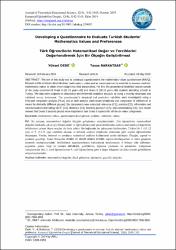Developing a questionnaire to evaluate Turkish students’ mathematics values and preferences
Citation
Dede, Y. & Barkatsas, T. (2019). Developing a Questionnaire to Evaluate Turkish Students’ Mathematics Values and Preferences . Journal of Theoretical Educational Science , 12 (4) , 1142-1163 . DOI: 10.30831/akukeg.529092Abstract
The aim of this study was to construct a questionnaire: the mathematics values questionnaire (MVQ).
Because a little is known about students’ mathematics values and no assessment tool is available to measure students’
mathematics values to obtain more insight into their perspectives. For this, the proportional stratified random sample
of the study consisted of Grade 5 (11-12 years old) and Grade 9 (14-15 years old) students attending schools in
Turkey. The data were subjected to descriptive and inferential statistical analyses by using a recently developed and
validated survey instrument. The questionnaire’s structural and predictive validities were investigated using a
Principal component analysis (PCA) and an item analysis (item-total correlations and comparison of differences in
means for distinctly different groups). Six components were extracted: relevance (C1), practice (C2), information and
communications technology (ICT) (C3), feedback (C4), learning approach (C5), and consolidating (C6). Our results
showed that Grade 5 students placed more importance than Grade 9 students for all the six value components. Bu çalışma, matematiksel değerler ölçeğini geliştirmeyi amaçlamaktadır. Zira öğrencilerin matematiksel
değerleri hakkında çok az şey bilinmektedir ve öğrencilerin kendi perspektiflerinden onların matematiksel değerlerini
belirlemeye çalışan ölçme araçları da fazla yoktur. Bu bağlamda; bu çalışmanın katılımcıları, Türkiye’de 5. (11-12
yaş) ve 9. (14-15 yaş) sınıflarda okuyan ve tabakalı seçkisiz örnekleme yöntemine göre seçilen öğrencilerden
oluşmuştur. Veriler, betimsel ve yordayıcı istatistiksel analizler kullanılarak analiz edilmiştir. Ölçeğin, yapısal ve
yordama geçerliği, Temel Bileşenler Analizi ve Madde Analizi (madde- toplam korelasyonları ve farklı grupların
aritmetik ortalamalarındaki farklılıkların karşılaştırılması) kullanılarak incelenmiştir. 6 bileşen elde edilmiştir:
uygunluk, pratik, bilgi ve iletişim teknolojisi, geribildirim, öğrenme yaklaşımı ve pekiştirme. Çalışmanın
sonuçlarından biri, 5. sınıf öğrencilerinin 9. sınıf öğrencilerine göre 6 değer bileşenini de daha önemli gördüklerini
ortaya koymaktadır.
Source
Kuramsal Eğitimbilim DergisiVolume
12Issue
4Collections
- Cilt 12 : Sayı 4 [11]



















